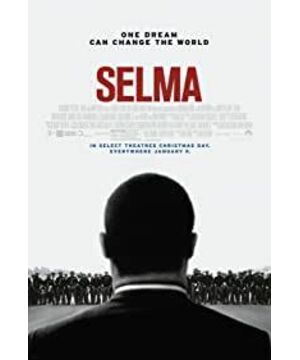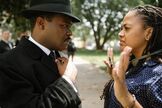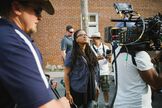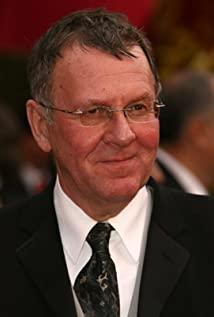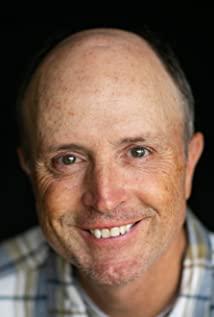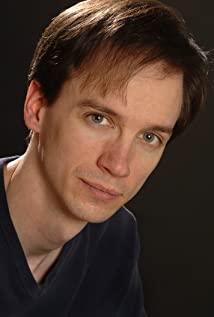tell. It reminded me of the lines in the book To Kill A Mockingbird: “You never really understand a person until you consider
things from his point of view…Until you climb inside of his skin and walk around in it.” I was just a person living in the
contemporary time, watching a period of the unfair past revealing in front of my eyes by means of a film, an entertaining tool.
I guess I could never share the similar feelings with those people, black men or white men, living in those days. But I admire
those who fight for equality, even lost their lives.
The plot was simple. The film focused on the event of marching from Selma to Montgomery, which was led by Martin
Luther King in year 1965. All they wanted was the right for the black men to vote. This path to right was paved by many
people’s sacrifices. But it was also because of the power and unity of people that they made it to the destiny.
I was impressed by how David Oyelowo interprets the role of Martin Luther King. He just got the point. During the
speech, he possessed the invisible power that could drive the audience’s emotions and inspire them. Moreover, he depicted a
vivid King in everyday lives, ordinary but real. The hateful mayor George Wallace was successfully played by Tim Roth. The
only pity is that I think the role of Lyndon Johnson (acted by Tom Wilkinson) was not fully interpreted. I would recommend
that more positive participation he took in this activity could be added into the film. If so, then the march may mean a lot
more. Besides the round characters, those flat characters surely surprise me. The producer Oprah Winfrey played the role of a
woman who wanted but couldn’t vote. Her first scene was so impressive and moving. When I saw her slowly and carefully
filled out the form and wrote “negro” on the “RACE” blank, my heart nearly stopped beating. Other minor characters such as
Jimmie Lee Jackson (by Keith Stanfield), Coretta King (by Marmen Ejogo) are all successfully portrayed. Because of them, I
was touched to tears for more than one time. Every character and actor is worth respecting.
In the film, Dr. King said one thing that left me with a deep impression. He said, “You young people believe in working
in the community in the long term, and raise black consciousness. What we do is negotiate, demonstrate and resist. We raise
white consciousness.” I couldn’t agree more with him. It was said that one-third of those taking part in the march were white
men. When Dr. King made the well-known speech I Had a Dream, it was reported that among 250 thousand audiences, 25%
were white men. I think the reasons those white men were present was not only because they showed sympathy with the black
men and desired for equality, but also that they showed up for themselves. There was no invitation or website announcing this
speech, but an ocean of people appeared. What you do proves what you believe. And what Dr. King said on the speech
precisely touched the audience. He was not only arguing for the black men, but also those who wanted the right and
democracy. The speech was I had a dream, not I had a plan. He inspired the nation. That was his glamour. The film didn’t
talk too much about Dr. King himself. It was about things around him. His friends, his wife, the suffering black men, the
enemy, the era he was situated in, and his belief. We didn’t see him as a super hero, but as an ambitious person fighting for the
right to vote. I would say that there was an invisible hand behind him, pushing him, and accomplishing the merge and trust
between all races and societies in America. Maybe who Martin Luther King is doesn’t matter. He was not worth talking about.
Maybe during a peaceful period of time he would be an ordinary person with an ordinary life. But he was worth reflecting
upon and contemplating about. To some extent it was because of the time and place he was in that made him a big name. No
one is a born hero. Maybe we should focus more on the situation and era.
In recent months, in America, a trial of news about white police gunshot black people has caused range among residents.
Should we blame that it is the setback of the era? In China there is an old saying that “taking the history as a mirror can know
the rise and fall of a nation.” The film came into the spotlight at the right time. It does remind us of the past. Perhaps it is the
time to reflect on ourselves. For some time I would think it was because of the media that sensationalized such news and
made it too big to be reversible. If instead a white man got killed in this way, the responses would not be so heated like it was
now. So for a country, there are definitely some scares that can’t be touched on. Ultimately, there is no absolute in the world.
No absolute democracy, no absolute equality. But there can be absolute in the world, as long as we see those exceptions as the
flaws during progression and deal with them positively and in a proper way. This then can be the improvement and
progression of mankind.
The background music was appropriate and nice. It managed to express the emotion and meaning of the film, and in the
meantime drive my emotions ups and downs. However I also noticed there were some shots that were shaking, which made
me uncomfortable.
I remembered that in the film when the lady was handing in the form, the white man ruthlessly said to her, “I say right
when it is right. ” However we strive, there is no absolute equality and right. Power is owned by a majority of people, not all.
But this film, Selma, tells us how to strive for that we are eager for. It is conveying a spirit. “They hate us because they aren’t
us.” But we are the darlings in our own eyes. Be what we are. The film tells us.
View more about Selma reviews


